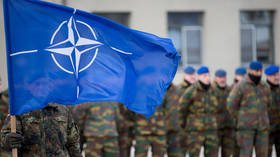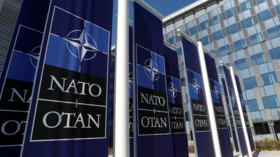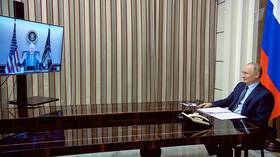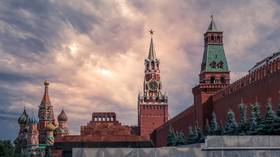Russia & NATO's post-Cold War showdown has arrived

Against the backdrop of the recent war scare over Ukraine, Moscow has put forward a series of proposals, taking US President Joe Biden up on his promise to listen to Russian concerns about potential further NATO expansion.
As a result, the Kremlin has now signed off on two drafts for treaties, one addressing the relationship with Washington and the other with NATO as a whole. These documents go far beyond the immediate issue of the peak in tensions about Ukraine, a country that has held ambitions to join the bloc since the 2014 Maidan. Instead, Moscow is offering a security blueprint for what would be the first real post-Cold War ‘reset’ of the relationship between, on one side, the US and, on the other, Russia.
It should be obvious to Western politicians that this is an important proposal that they should consider carefully whether they like or dislike the specific points raised by Moscow. This needs underlining since some commentators have already dismissed the initiative as, in essence, nothing but a cunning ploy to set the scene for invading Ukraine with massive force. This guess, although it fits well with the paranoid style of American Russia Rage, is likely to be wrong.
In reality, Moscow’s proposals are consistent, as other Western commentators have acknowledged, with long-standing Russian concerns. In fact, you could think of them as the sum of issues that the Kremlin has repeatedly articulated since President Vladimir Putin’s speech at the Munich Security Conference of 2007. There he warned that Moscow was deeply dissatisfied with American unilateralism and disregard for the sovereignty of other states and, in general, the manner in which Russian interests received little consideration from the West. NATO’s careless response at the time was to dismiss the message as “disappointing and not helpful,” (then-NATO Secretary General Jaap de Hoop Scheffer) and, shortly afterwards, make use of its 2008 Bucharest summit to promise membership for Georgia and Ukraine, two former Soviet republics that border on Russia.
Thus, Russian concerns that have been voiced for almost one-and-a-half decades cannot be a mere improvisation to create a pretext for an attack. A war, unfortunately, cannot be entirely ruled out, no matter who would start it. But Moscow’s two treaty drafts are the outcome of processes long antedating this particular crisis.
Once we treat the Russian proposals seriously, what should the West do about them? The first key step toward an intelligent response is to make a key distinction. It is simple but worth spelling out. There are two related but different questions at stake: The first, fundamental one is if it is time for a major re-arrangement of the relationship between the West and Russia. The second, more specific issue is what precise shape such a genuine reset should take. The current Russian initiative clearly aims at both issues at once. The challenge for Western leaders will be to distinguish them and only then devise a careful response.
Here is the catch about issue number one: A major change in how the West and Russia relate to each other is inevitable, in fact already underway. Yet the West’s perception of its relationship with Moscow is still principally based on Russia’s historically anomalous 1990s position. But the extremely and unusually weak Russia of those days was never going to last because it was unstable to the core: It could only get even weaker, in which case the country would probably have imploded by now, with truly horrendous side effects of war and anarchy, or stronger, which is the outcome we have seen in our real world.
In other words, sometime between, say, 2008 and 2014, the post-Cold War era has ended, and we are now in a post-post-Cold War world. It is this tectonic shift, Russia’s come-back, far from perfect yet substantial, that fundamentally drives the need for a geopolitical re-adjustment. The latter can happen in a deliberate and negotiated manner, or the movers and shakers of the West, first of all the US, can decide to let geopolitical nature take its course. The second course of, as it were, malign negligence would lead to a much bumpier ride to a new status quo, quite possibly with catastrophic effects.
There is, put differently, no intelligent option of going on as before. The question is only what shape a controlled reset will take. And that means we need to enter the realm of creative negotiation.
First, three red herrings need discarding: Moscow has struck a resolute tone, insisting on a quick Western response. Moreover Sergey Ryabkov, Russian deputy foreign minister and directly in charge of this process, has emphasized that the West should consider his country’s ideas as a whole, not a “menu from which one can pick and choose this or that.” Yet this does not mean there is no room for give-and-take. Instead Russia’s forceful opening moves make more sense as an attempt to shake the West out of its complacency.
Second, at least one American analyst has already grumbled that what he sees as the Kremlin’s combination of military pressure and offers to talk is too rough to qualify as proper diplomacy. That is a baffling complaint coming out of America, a country that habitually combines its “negotiations” with sanctions, sometimes crippling, and threats of war, repeatedly made true. The point is not to score a tit-for-tat, though. It is simply that the mixing of strong-arm tactics and diplomacy is, unfortunately, not unique – and therefore no reason to avoid negotiations.
Third, this is no time to, once again, get stuck on the issue of what the West promised Russia after the Cold War. The answer is, actually, clear: the USA did promise not to expand NATO and then broke those reassurances. If you like scholastic debates, you can discuss whether this promise was given in 1990, 1993, or both. That’s all. That’s the real scope of disagreement here, as Angela Stent, an American expert above suspicion of being soft on Russia, has acknowledged. But the issue is overrated anyhow. Even if the West had made and broken no promises, we would probably look at the same situation now because Russia’s recovery is the key factor of change. What the West’s unprofessional dishonesty has added is merely additional distrust.
What does matter now are Moscow’s key demands and how creative – or not – Western leaders will be in response. In sum, Russia demands an explicit stop to NATO expansion; in particular, a retraction of NATO’s 2008 promise of future admission to Georgia and Ukraine; an end to additional drift of NATO military forces in those countries that joined the alliance after the end of the Soviet Union (unless with Moscow’s consent); a mutual agreement not to station land-based mid-range missiles (that can carry nuclear warheads) in areas within striking range of the other side; another mutual agreement to restrict the size of maneuvers (and thus the peacetime concentration of troops) in proximity to sensitive borders between Russia and the West, and a revival of institutionalized mutual consultations.
Generalizing its recent position on Ukraine, Moscow also demands that the US should not establish military bases in states that used to belong to the former Soviet Union, use their military infrastructure, or cooperate with them militarily. Lastly, Russia proposes that both it and the US should stop stationing nuclear weapons outside their own borders.
No matter how justified from Russia’s point of view, this is a very tall order. It is hard to see how the West could agree to all or even most of it. But that is not the real question. Despite Moscow’s tough tone, Western leaders have a simple due-diligence duty to explore the space for compromise. This won’t be easy, for two reasons: First, Moscow will not negotiate against itself, as it often did in the 1990s. Instead, it will do what powerful states usually do and look out for its own interests. A West pretending, for instance, that its ill-motivated and misguided membership promise for Georgia and Ukraine must have the status of sacrosanct scripture will have a hard time coming to terms with a Russia that has dug in its heels as never before.
But, second, the West is no monolith: while some governments and leaders will be ready for a deal (though not any deal), others will take a purely obstructionist position. The first camp may include France, Germany, and, decisively, Biden’s US (as of now) ready for retrenchment; the second will prominently feature the Baltics and Poland. Countries such as Italy, Greece, or the Czech Republic will either take a wait-and-see position or fall along a spectrum between the potential deal-makers and the obstructionists. That is the best-case scenario. The worst-case outcome is that the West might simply brush off Russia.
Fortunately, there are signs that the latter may not happen. First Western responses have been mixed, including the expectable reiterations of dogma, such as the daft mantra that Russia has no ‘veto’ as well as retorts highlighting that the West, too, has grievances and demands. It may be counterintuitive, but the latter response is reason for hope: A West that gets down to specifics – be it its sense of Russian political meddling, Moscow’s intervention in Ukraine, or its missiles in the Kaliningrad enclave – is a West that can negotiate and seek compromise. It would be nice to seriously try that, for a change.
The statements, views and opinions expressed in this column are solely those of the author and do not necessarily represent those of RT.
The statements, views and opinions expressed in this column are solely those of the author and do not necessarily represent those of RT.

















